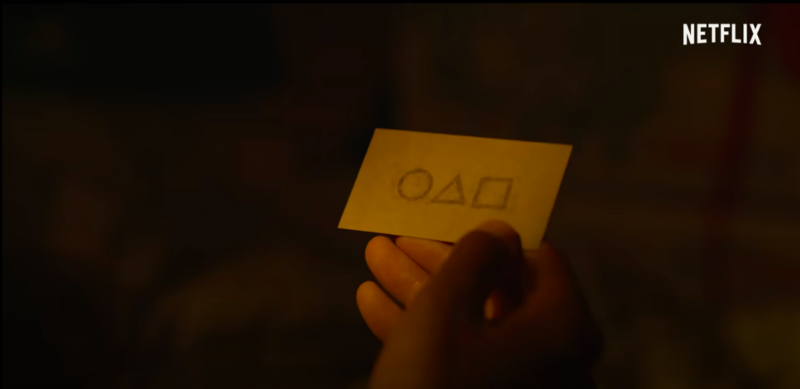
The ominous card given to the participants in the Squid Game. A screenshot from Netflix's YouTube promotional video.
The popular streaming service Netflix said its new series, Squid Game, created by Korean director Hwang Dong-hyuk, became the platform's most-watched show. The series, which portrays a survival game among impoverished, debt-ridden residents in South Korea, has sparked conversations about how unequal economic systems trigger a deadly battle for survival.
Aikyn Konurov, the leader of the People's Party of Kazakhstan a member of parliament, said that the tragic competition of Squid Game plays out in real life, as people in Kazakhstan try to grapple with mounting debt and poverty.
“These problems exist all over the world. Kazakhstanis have been playing this game for a long time,” Konurov said at a press conference.
The People's Party was born in 2004 from the merger of a fraction of the Communist Party and the People's Party. It used to be called Communist People's Party until November 2020, when the members decided to drop the “Communist” moniker.
In the January 2021 elections, the People's Party obtained a record 10 seats in the 107-member parliament, while the lion's share of the vote was unsurprisingly captured by the long-reigning Nur-Otan party.
Konurov went on to blame exasperation and bursts of violence – such as the shooting that targeted bailiffs in the process of repossessing a home in September – on predatory lending. “Our financial system is sick, it breeds discontent, it creates social tension,” he said.
According to the country's Central Bank, individual debt rose by 17 percent in the first seven months of 2021. The Financial Association of Kazakhstan, a sectoral lobby group, said in a report that the loan portfolio in commercial banks has grown significantly in the past three years.
In a joint statement with the Confederation of Labour, a trade union organization, the People's Party called on the government of Kazakhstan to ratify the International Labor Organization's Convention 131, which regulates the minimum wage.
In a follow-up interview with the news site Orda.kz, Konurov said his party would demand that the government increase the minimum wage to 90,000 tenge (around 210 US dollars) from today's 42,500 tenge (around 100 US dollars) per month. Earlier this year, President Kassym-Jomart Tokayev promised a 40 percent increase to 60,000 tenge starting from January 2022.
The campaign to increase the minimum wage, called “For a dignified salary!” was posted on the global petition website Avaaz.org. It has so far gathered only about 300 signatures, a far cry from the 10,000 the party promised during the press conference.
In September, the People's Party presented a draft law to parliament that would establish the principle of individual bankruptcy, which would change the rules of engagement for debt collection. While the law is still under review, its proponents say that, with such protection, individuals could not be deprived of their home. After a deadly shooting in Almaty, the country's largest city, deputies cited “monstruous” debt collection practices as the shooter's motive.
In a mockery of Tokayev's 2019 policy of the “listening state,” the open-door policy of transparency inaugurated by the new president, in June the People's Party sent hearing aid devices and prescription glasses to the members of the government. The move, aimed to stir controversy, was a provocation to nudge the government to fulfill the promise and listen and look closer into the problems of the population, according to the party's MPs.
While the harrowing carnage portrayed in Squid Game is certainly not how life plays out in everyday Kazakhstan, the rare admission that inequality and poverty have become increasingly widespread across the country is perhaps a relevant social critique coming from a historically-timid political opposition.
In neighboring Uzbekistan, another kind of social critique emerged from a popular Telegram channel, Troll.uz, which shared a doctored picture of one of the games played in the series, highlighting how difficult and complicated the solution would be in Uzbekistan.
In the series, some players find that the solution to a complicated puzzle is to lick the back of a sugar cracker. This moment in the show was used as a metaphor for the Kafkaesque situation in the country, where “to win, you must lick well.”
The all-too-real reception of the dystopian Netflix series in Central Asia suggests that the socio-economic conditions have worsened in recent years and the population is increasingly indebted.






